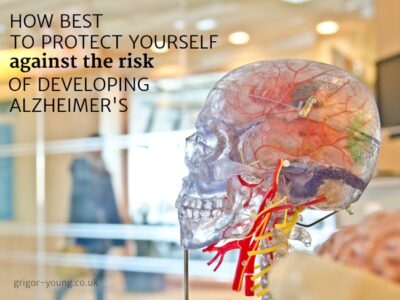If the question is whether we would like to live to be at least 80 years old, most people’s answer would be “yes”.
That’s certainly the response neuroscientist and novelist, Lisa Genova, received from the TED conference audience she asked in April 2017. We all have a hopeful expectation of living into old age.
Lisa then asked her audience to project themselves into their futures and imagine that everyone in the room is 85 years old.
In that scenario, every second person probably has Alzheimer’s dementia. And, if you take the view that “I won’t be one of the ones with Alzheimer’s”, well, you’re still potentially affected by it – as a carer for someone with the condition.
So, on one view, this scary and upsetting disease is unlikely to be avoidable for any of us.
On the other hand, given that Lisa’s talk is entitled “What you can do to prevent Alzheimer’s”, it’s a relief to know that the remainder of what she says is devoted to explaining why we are not powerless in the face of Alzheimer’s. Why it’s not the case that Alzheimer’s is our brain’s inevitable fate, if we are fortunate to live long enough.
How does Alzheimer’s develop?
Though entering a room and asking yourself “What did I come in here for?” is not necessarily an early sign of Alzheimer’s, using the example of car keys, the following questions could be taken to illustrate the progressive stages of the condition. From –
- Where did I put my car keys?
to – - Why did I put my car keys in the fridge?
to – - What are these funny-shaped plastic and metal items for?
Taking a neuroscientific approach to the development of Alzheimer’s, the starting point is the fact that the neurons in the brain are connected by synapses. This is the means by which signals are transmitted and “we think, feel, see, hear, desire … and remember.”
Synapses are the weak point where Alzheimer’s occurs.
Neurons release neurotransmitters, such as glutamate, into their synapses. But they also release a substance – a peptide – called amyloid beta. In a healthy brain, the amyloid beta is metabolised away. However, most neuroscientists believe that the seeds of Alzheimer’s are sown when amyloid beta starts to accumulate – either because too much is released or not enough removed or both.
The formations which develop – called amyloid plaques – will not translate immediately into symptoms affecting memory, language, or cognition. It might take 15 to 20 years or more. The brain seems to reach a tipping point, after which the clinical symptoms of the disease become apparent.
The search for a “cure” for Alzheimer’s is largely focused on developing drugs which hinder the accumulation of amyloid plaques. This is more of a preventative approach than a true cure.
What self-help options do we have?
Some of the things listed by Lisa are “obvious” because they form part of what we would all instinctively recognise as a healthy lifestyle.
- Cardiovascular health is important. Aerobic exercise reduces amyloid beta. And a Mediterranean diet will also help.
- Smoking, high blood pressure, high cholesterol, diabetes, and obesity are all linked to increased risk of Alzheimer’s.
- Getting enough sleep is important because it is during sleep that much of the clearing out of metabolic waste in the brain takes place. Many scientists believe that poor sleep hygiene can be a predictor of Alzheimer’s.
The possible game-changer in self-help relates to neural plasticity and cognitive reserve.
Alzheimer’s advances by disabling synapses. Against this, every time we learn something new, we create and strengthen synapses.
The more functional synapses you have in your brain, the greater your cognitive reserve. In simplified terms, this can buffer you from the symptoms of Alzheimer’s because your brain has alternative neural pathways it can bring into play if a particular synapse is disabled. A successful ‘detour’ is possible for signals within the brain.
How do we create these new synapses and pathways?
According to Lisa, “we want these new things to be as rich in meaning as possible, recruiting sight and sound and associations and emotion.”
It’s not about simply retrieving old information you’ve already learned (doing crossword puzzles is not on the list of recommended activities).
It’s about challenging yourself with new things. The examples she gives are:
- Learning a new foreign language;
- Making new friends;
- Reading a book; or
- Listening to a great TED Talk.
Speaking of which, Lisa’s inspiring TED Talk is available to watch online or you can read the transcript.
From our legal perspective on this issue, a practical thing you can do to mitigate the possible effects of Alzheimer’s or other similar diseases on you (and your family, as carers) is have a Continuing Power of Attorney.
If you lose the mental capacity to manage your own affairs and you don’t have a Power of Attorney in place, it’s not a disaster. A loved one could apply to the court for appointment as your Guardian under the Adults with Incapacity legislation. But a Power of Attorney simplifies things – and shows consideration for – those dearest to you.
Returning to Lisa and her talk, she is at pains to stress that a diagnosis of Alzheimer’s is not a reason for the affected person to stop living. The emotional memory is resilient. You will still have capacity to experience love and joy.
How we can help
While we cannot promise to be able to answer your neurological questions here, we can help with queries relating to Powers of Attorney and Guardianship.
Please feel free to contact us. All initial enquiries are free of charge and without obligation.
You can contact a member of our Private Client team on 01343 544077 or by sending us a Free Online Enquiry.


